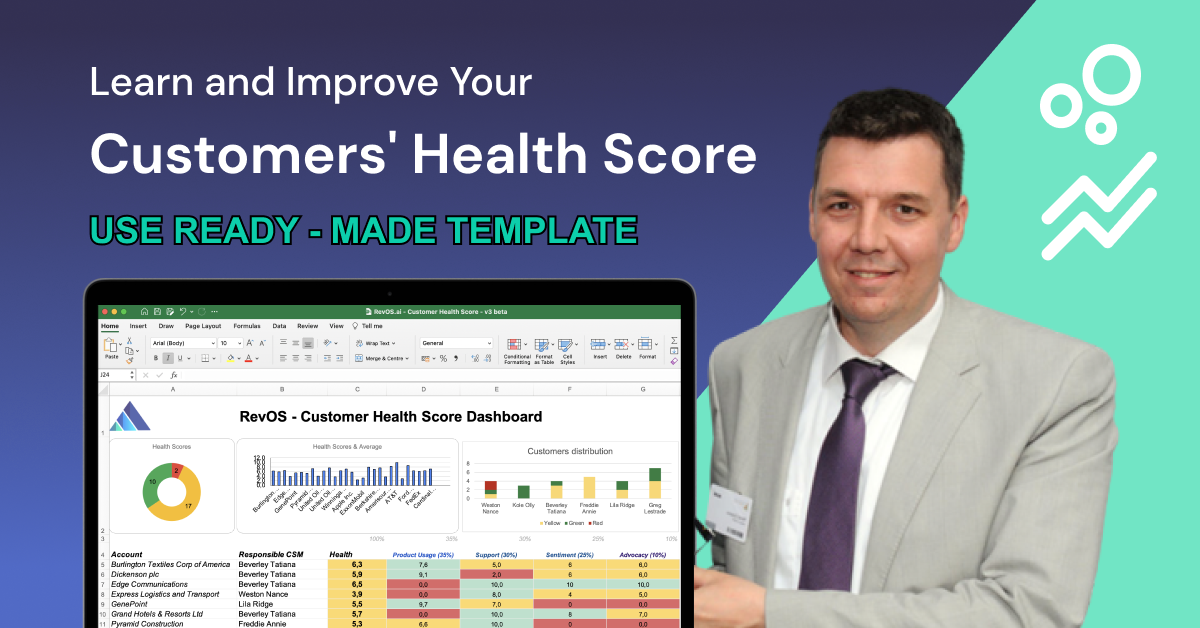Effective Lead Scoring: The Benefits of Analysing Job Titles and Seniority Levels
 Renat Zubayrov
Renat ZubayrovOne of the criteria that can be used for lead or deal scoring is job seniority. This could involve assigning a higher score to leads that hold higher-level positions within a company, such as a C-level executive or vice president, as they may have more decision-making power and budget authority. Conversely, leads with lower-level positions, such as entry-level employees, may be assigned a lower score.
Similarly, for customer health scoring, job title and seniority can provide insight into the level of engagement and satisfaction with the product or service. A high-ranking executive who is actively using and promoting the product is likely to be a satisfied customer and may also have the potential to become a valuable advocate for the company.
In addition, assessing the job titles and seniority levels of existing customers can provide insight into their level of engagement with the product or service, as well as their potential to become valuable advocates for the company. This can help businesses to identify opportunities for upselling, cross-selling, and referral marketing.
However, it's important to note that job title and seniority are not the only factors that should be considered when scoring leads or assessing customer health. Other factors such as industry, company size, past purchasing behavior, and level of engagement with the company should also be taken into account.
Benchmarking
The benchmarking of the criteria is very specific to a particular ideal customer profile (ICP) and/or sales process. In a typical B2B scenario sales process involve multiple people from the customer side acting in multiple roles. It’s critically important to clearly understand the roles of the contacts in that process and act accordingly. Here are some examples:
- Job Title as Lead Scoring Criteria: a B2B software company may prioritize leads with job titles such as CTO, Director of IT, or VP of Engineering, as these individuals are likely to have the budget and decision-making authority to purchase their software solution.
- Job Seniority as Customer Health Scoring Criteria: an e-learning platform may consider customers with job titles such as Manager, Director, or Chief Learning Officer as high-value customers as they are responsible for the learning and development programs within their organizations. By monitoring their engagement levels and satisfaction, the platform can assess their health and identify upselling or cross-selling opportunities.
- Combined Criteria for Lead Scoring: A financial services company may combine job title, company size, and industry to prioritize leads with job titles such as CFO or Controller at mid-to-large sized companies in the manufacturing or technology industries.
- Combined Criteria for Customer Health Scoring: A SaaS company may combine job seniority, account size, and product usage to assess customer health. For example, a customer with the job title of VP of Sales, a large account size, and high usage of the software is likely to be a high-value customer who is satisfied with the product and is a potential advocate for the company.
Challenges
There are a few challenges to using job seniority as a criteria for lead scoring:
- Job titles can be ambiguous: Job titles can be ambiguous and may not accurately reflect a person's level of decision-making power. A lead may have a high-level job title but may not have the budget authority or decision-making power that would make them a valuable customer.
- Not all high-level positions are equal: High-level positions may not be equal in terms of decision-making power and budget authority. A lead who holds a high-level position in a small company may not have the same level of decision-making power as a lead who holds the same position in a large company.
- It may not be accurate in certain industries: Job seniority may not be an accurate indicator of decision-making power or budget authority in certain industries, such as non-profit organizations, or government agencies where titles do not always align with decision-making power.
Alternatives
There are a number of alternative criteria that can be used in addition to or in place of job seniority when scoring leads:
- Industry/Company size: The industry or size of the company can also be an important factor when scoring leads. Leads from certain industries or larger companies may have more budget or decision-making power.
- Engagement: Lead's engagement level can also be used to score leads. Leads who have been engaging with the company's website, social media, or other marketing channels may be more interested in the company's products or services.
- Demographic: Lead's demographic information such as age, location, gender etc can also be used to score leads. Leads from certain demographics may be more likely to convert into customers.
- Website activity: Leads who visit the company's website frequently, spend a significant amount of time on the site, or visit specific pages (such as pricing or product pages) may be more interested in the company's products or services and can be given a higher score.
- Email engagement: Leads who open emails from the company, click on links, or respond to the emails may be more interested in the company's products or services and can be given a higher score.
- Social media engagement: Leads who interact with the company's social media posts, such as liking, commenting, or sharing, may be more interested in the company's products or services and can be given a higher score.
- Event attendance: Leads who attend company events such as webinars, trade shows, or meetups may be more interested in the company's products or services and can be given a higher score.
Are you looking to improve your customer success strategy and boost your business growth? Look no further than our practical course on Customer Health Scoring, including a customizable template! And now with a code LINKEDIN50 you’ll get a 50% off the regular price.
This practical course provides valuable insights into using customer health scoring to improve customer engagement, retention, and loyalty. You will learn how to develop a robust customer health score metric and track it over time to identify trends and opportunities for improvement.

Our course includes a step-by-step guide to creating a custom template for your customer health scoring, so you can quickly and easily start measuring the health of your customer relationships. Plus, you'll receive hands-on support and guidance from our team of experienced instructors.
Whether you're new to customer health scoring or looking to refine your existing strategy, this course is the perfect way to take your business to the next level. Enroll now and start boosting your customer success today – don't wait!
Read more about revenue operations, growth strategies, and metrics in our blog and follow us on LinkedIn, Youtube, and Facebook.
← Go back to blog